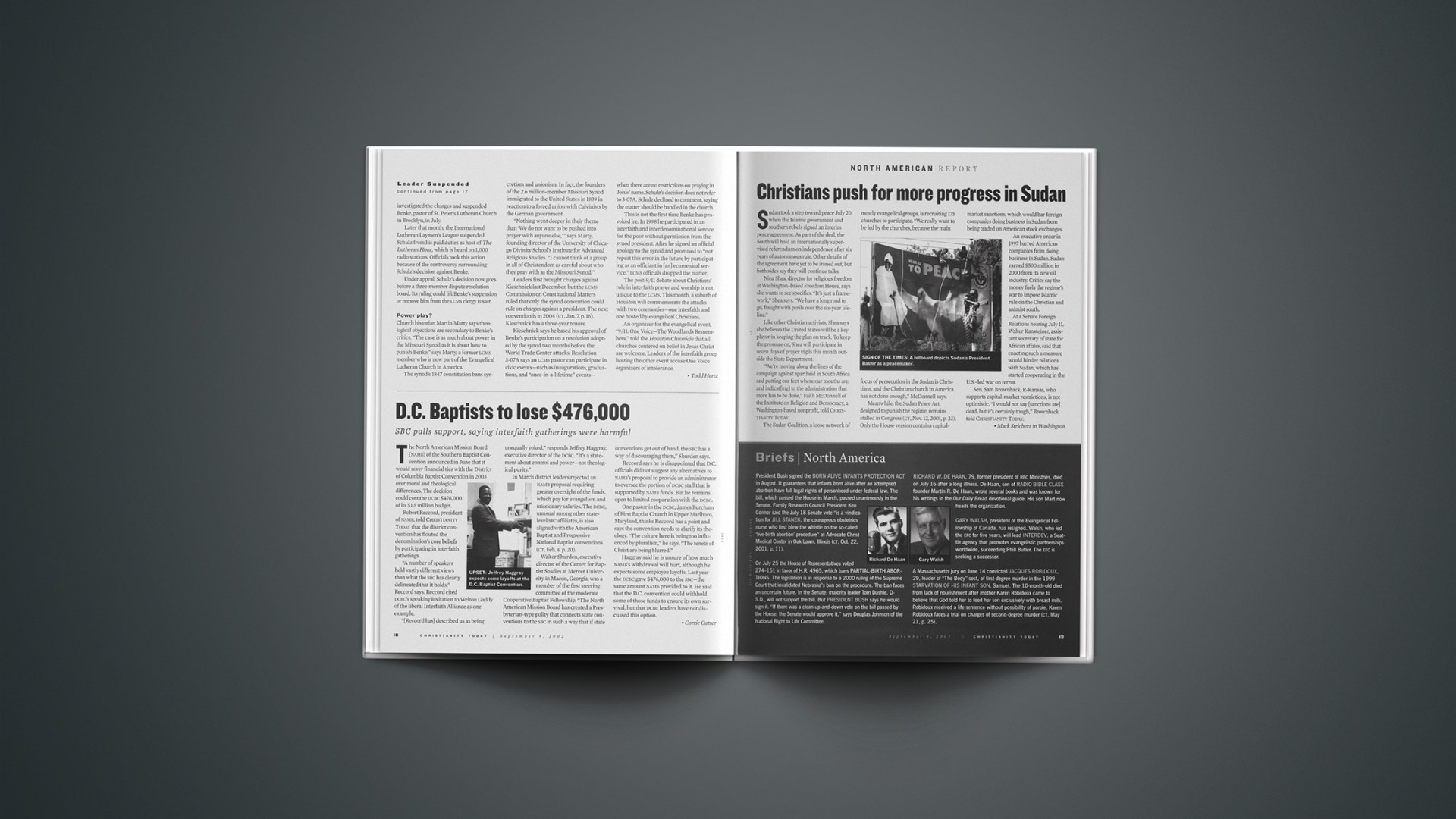Sudan took a step toward peace July 20 when the Islamic government and southern rebels signed an interim peace agreement. As part of the deal, the South will hold an internationally supervised referendum on independence after six years of autonomous rule. Other details of the agreement have yet to be ironed out, but both sides say they will continue talks.
Nina Shea, director for religious freedom at Washington-based Freedom House, says she wants to see specifics. “It’s just a framework,” Shea says. “We have a long road to go, fraught with perils over the six-year lifeline.”
Like other Christian activists, Shea says she believes the United States will be a key player in keeping the plan on track. To keep the pressure on, Shea will participate in seven days of prayer vigils this month outside the State Department.
“We’re moving along the lines of the campaign against apartheid in South Africa and putting our feet where our mouths are, and indicat[ing] to the administration that more has to be done,” Faith McDonnell of the Institute on Religion and Democracy, a Washington-based nonprofit, told Christianity Today.
The Sudan Coalition, a loose network of mostly evangelical groups, is recruiting 175 churches to participate. “We really want to be led by the churches, because the main focus of persecution in the Sudan is Christians, and the Christian church in America has not done enough,” McDonnell says.
Meanwhile, the Sudan Peace Act, designed to punish the regime, remains stalled in Congress (CT, Nov. 12, 2001, p. 23). Only the House version contains capital-market sanctions, which would bar foreign companies doing business in Sudan from being traded on American stock exchanges.
An executive order in 1997 barred American companies from doing business in Sudan. Sudan earned $500 million in 2000 from its new oil industry. Critics say the money fuels the regime’s war to impose Islamic rule on the Christian and animist south.
At a Senate Foreign Relations hearing July 11, Walter Kansteiner, assistant secretary of state for African affairs, said that enacting such a measure would hinder relations with Sudan, which has started cooperating in the U.S.-led war on terror.
Sen. Sam Brownback, R-Kansas, who supports capital-market restrictions, is not optimistic. “I would not say [sanctions are] dead, but it’s certainly tough,” Brownback told Christianity Today.
Copyright © 2002 Christianity Today. Click for reprint information.
Related Elsewhere
For more articles on Sudan see Christianity Today‘s World Report or Yahoo full coverage.
Our earlier coverage of the Sudan conflict includes:
Legacy of an Ancient PactWhy do Christians still chafe under restrictions in some Muslim nations? It all started with Umar. (July 26, 2002)
Weblog: Peace For Sudan?Both sides agree to secession for southern Sudan. (July 22, 2002)
A Cry for HelpSudanese Christians gather in Houston and ask for U.S. support. (June 27, 2002)
Slave RedemptionAmericans are becoming instant abolitionists. But is the movement backfiring? (Aug. 9, 1999)
Freedom Panel Alleges GenocideU.S. Commission on International Religious Freedom makes suggestion on Sudan’s worsening abuses. (May 4, 2001)
Turn Off Sudan’s Oil Wells, Say Canadian Church VisitorsChristian leaders say they are “outraged” that a Canadian oil company is paying huge royalties to Sudanese government. (Apr. 20, 2001)
The Maturing of VictimhoodA new exhibit at the Holocaust Museum is a very good sign. (Mar. 29, 2001)
Sudan Loses Election for U.N. Security Council SeatSanctions continue to plague the African nation’s bid for international acceptance. (Oct. 12, 2000)
Southern Sudan Bombed Despite Cease-fire PromiseDetails sketchy from town of Yei, near Democratic Republic of the Congo. (May 8, 2000)
Editorial: Confronting Sudan’s EvilsWestern Christians and governments should press Khartoum on multiple fronts. (Apr. 12, 2000)
Sudan Relief Operations EndangeredRebel demands cause agencies to curtail efforts. (April 3, 2000)
Bombs Continue to Fall on Ministry Hospitals in SudanSamaritan’s Purse hit for fourth time, two killed in Voice of the Martyrs bombing. (March 24, 2000)
Mixing Oil and BloodSudan’s ‘slaughter of the innocents’ toughens religious freedom coalition. (Mar. 15, 2000)
Protest Begins as White House Rethinks Policy on Sudan RegimeReligious leaders urge Clinton administration to act against oppression. (Feb. 10, 2000)
Christian Solidarity Loses U.N. StatusSlave-freeing organization’s rebel spokesman violated U.N. rules (Dec. 14, 1999)
Sudan Releases Jailed Catholic PriestsPresident Resolves Impasse in Contrived Bombing Trial (Dec. 13, 1999)
Jailed Sudanese Priests Reject Presidential AmnestyClerics waiting for ‘total acquittal’ by courts. (Dec. 6, 1999)
Oil Exports Draw ProtestsChristians urge divestment from Canadian company (Nov. 15, 1999)
Starvation Puts 150,000 at Risk (Sept. 6,1999)
The Price of a Slave“I was taken by a slave master [who] beat me and shamed me, telling me that I was like a dog.” (Feb. 8, 1999)
Sudanese Christians Bloody, but Unbowed (Aug. 10, 1998)
How Apin Akot Redeemed His Daughter (Mar. 2, 1998)
Muslim-Christian Conflicts May Destabilize East AfricaChristians raped, forced into slavery, and killed. (Apr. 29, 1996)










